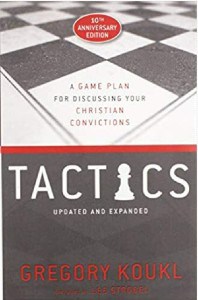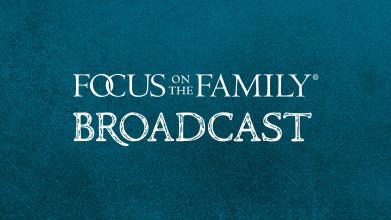Preview:
Greg Koukl: Jesus, very rarely got to the so-called gospel. You know, he didn’t get out the, the, the steps and then invite people to receive Christ. A lot of what He did was get to the bad news and He didn’t get to the good news. What was He doing? He was getting people thinking about the things they needed to be thinking about. He was what I call, putting a stone in their shoe. Annoying them in a good way.
End of Preview
John Fuller: Well, Greg Koukl joins us today on Focus on the Family, to give you some practical ideas for how to share your faith with pretty much anybody you run into. Your host is Focus president and author Jim Daly. And I’m John Fuller.
Jim Daly: You know, John, uh, we don’t mention it very often, but we have five, uh, strategic areas in mind at Focus on the Family. The first is evangelism and discipleship. Today’s program fits into that. Of course, second would be marriage and then third parenting and advocacy for children. That’s our ultrasound machine project, our foster adoption efforts, and then engaging the culture. So, if you wonder how we decide shows, and what we wanna do, uh, typically it’s gonna fit into those five areas.
John: Mm-hmm.
Jim: And, uh, today I’m really happy to say we are concentrating on evangelism and discipleship with our guest. Uh, when you look at the culture today, uh, there’s so often this angst about sharing faith. Should I, do it? Should I not? I, I, I might be embarrassed. I might be called a name. And, uh, I think at the end of today’s program and with the resource we’re gonna talk about, uh, you will be fully equipped to engage somebody in a discussion about eternity, about their relationship or non-relationship with God and what they can do to remedy that.
John: Mm-hmm. Yeah. And Greg Koukl is, uh, an apologist for the faith. He’s founder and president of Stand to Reason ministries. He’s the host of a talk show and he’s written a number of books, including one that we’re talking about today, Tactics: A Game Plan for Discussing Your Christian Convictions. And we have copies of that here at the ministry, uh, give us a call, 800-A-FAMILY, or stop by focusonthefamily.com/broadcast.
Jim: Hey, Greg, welcome to Focus on the Family.
Greg: Thank you fellas, it’s a real treat to be with here today.
Jim: Now, I, I, I want to start in an interesting spot, when you were younger and you like many people, uh, in your twenties, it feels like, you were smarter than the average guy and you thought, I don’t need to be a Christian.
Greg: Yeah. Yeah.
Jim: I mean, I’m smarter than these guys and they’re not that smart.
Greg: Yeah. I-
Jim: Why did you have that feeling?
Greg: Uh, well, I was raised in a, a Christian environment and it was, uh, uh, v- very perfunctory. You know, you just kinda go to church on Sundays, you do the thing, basic thing, but there was nothing else in our life really that was deeply informed by, by our, our spiritual convictions. We lived a secular life most of the time. It’s like a lot of people. And so, when I was about 17 years old, uh, maybe 18, I was challenged by my own convictions and somebody asked me, “Do you really believe that?” And I thought to myself, no, I guess I don’t really believe it. And then I walked away. Now this was mid ’60s, and so there were a lots of distractions that were entering the culture at that time. They were a lot more appealing than, uh, religion.
Jim: Sure.
Greg: And so, I went that way and I left religion behind me. And then I got, I was at Michigan State University in an honors program there, honors college there, and a pre-law program. And, and, uh, I just, like you mentioned, I, I thought I was too smart to be a Christian. I thought it was, uh, for, for people who needed to have other people do their thinking for them, basically. And I just didn’t want any of that. So, I just walked away from that. And for about six years, I totally embraced a secular culture.
Jim: Yeah. And in some ways that gives such validity to your conversion.
Greg: Mm-hmm.
Jim: And what, the other aspect I like about it, uh, that you wrote about in Tactics, is it, the, just the slow process it was. It wasn’t this instantaneous blinding of a light.
Greg: That’s right.
Jim: That, you know, there was only yes or no.
Greg: Right.
Jim: I mean, it, it, and that truly is how most people come to faith. It’s over time.
Greg: You know what? That’s a really good observation. It’s pertinent to our discussion today because, um, very few people nowadays, when they hear the gospel for the first time, or even the second time, or maybe the third time say, “All right, I get it. I’m in, where do I sign up (laughs)?” You know, there’s lots and lots of resistance to the gospel. And so, when we, when we have, uh, uh, uh, an evangelism technique that is focused on harvesting, okay, let’s pray with the person. Let’s give them a sign on the dotted line. Let’s close the deal. Man, that really puts a lot of Christians off because that, that seems like fighting words for a lot of folks. And in our culture with the hostility that seems is building more and more, okay. This just scares people away, Christians. And I understand that completely. And so, they’re sitting on the bench rather than being engaged. And over the years, I, I have come to understand that before there can be a harvest, there has always got to be a season of, let’s just call it gardening, all right? It’s that period of time that, that we experience, if we become Christians as, uh, adults, that we’ve been thinking over, mulling over, listening, pushing away from the table, coming back to the table, asking questions. That long period of time that usually has multiple people involved in our lives, doing a little here, doing a little there, before the harvest is ready. And that’s the thing that I focus on in my approach.
Jim: And, and the point is, that’s always in the back of your mind, that should be, uh, is this person ready?
Greg: Yeah.
Jim: Do you think this person’s there?
Greg: That’s right.
Jim: But a good approach is to consider yourself the gardener.
Greg: This is what-
Jim: And to water and to till, and to pick out a couple of weeds.
Greg: Exactly. Yeah.
Jim: And those weeds in my mind would be people that have errant beliefs about Christianity, about Christians, who Christ was.
Greg: Right. Right. Right.
Jim: I mean, that’s the weeding of the spiritual garden in that person’s heart.
Greg: That’s right. In fact, I’ll put it more strongly than that. I have been a Christian for 47 years. I’ve, most of that time I’ve been in active ministry. Uh, Stand to Reason is 28 years old, so I’ve spoken to more than 80 college and university campuses around the country and other places, the world. But I never have it as my goal to get somebody to sign on the dotted line when I engage in a conversation with them about Christ. And the reason I don’t do that is because I have a plan that I’ve found to be much more effective to making a difference, especially in the gardening thing. I learned a long time ago that I wasn’t really a good harvester, even though I prayed during the Jesus movement with people to receive Christ. I realized that what I do when I speak at, uh, at events, when I write books, when I’m on shows and in my own radio show, what am I doing? I’m, I’m just gardening. I’m tilling, I’m planting. I’m pulling weeds here and there. And in the process of gardening over time, people get ready for the harvest. And when the harvest is ready, when the fruit is ripe, it just falls into the basket. It’s easy when the fruit is ripe. And this is why I think most people are not harvesters, but they’ve been forced into a harvest mode. I think most people are gardeners.
Jim: No, and that’s good. And we’re gonna, uh, uh, unpack that and explore that over the next few minutes. L- let me start with a phrase, uh, that I’ve used, uh, which is something like this. You can’t argue someone into the kingdom. I, I may say that slightly differently, it’s more like the finger wagging.
Greg: Mm-hmm.
Jim: Because what I have found is that when you are arguing with somebody vehemently, with emotion, if I could say it that way, people’s hearts tend to close down.
Greg: Mm-hmm. Yeah.
Jim: I mean, how many people do you respond to that are in your face, arguing with emotion.
Greg: Right (laughs). Right.
Jim: But you do say there’s a way to argue lovingly.
Greg: That’s right.
Jim: And I would accept that, but I just think the finger-wagging argument, I mean, my own spirit closes down to somebody who’s rushing me emotionally.
Greg: Sure. Of course. Well, my approach to that is if anybody gets mad, I lose. All right?
Jim: Right. That’s good.
Greg: If I get mad, I lose. If they get mad, I lose. Okay. And a lot of times people, people get mad because of the style. Now, my response to that comment that you can’t argue anyone into the kingdom, is maybe a little different, because I’m thinking of arguing as making a case as opposed to getting into a quarrel. If you get in a quarrel, people get mad, they’re blocked off. But if you’re making the case, offering reasons for it, that’s powerful when used by the Holy Spirit.
Jim: Let me ask you in that context. So how do you refrain from the emotion of making the case? And I think that’s key.
Greg: Yeah.
Jim: Because, uh, unlike the maybe detached attorney, who’s pleading with the judge or the jury, uh, that seems very, uh, applicable.
Greg: Okay. Right (laughs).
Jim: But when you’re in it going, “Listen, that is stupid what you’re thinking?” I mean (laughs), that’s not gonna work.
Greg: You know, I know, listen, I’m chuckling now because I’m at Focus on the Family. And in families, you have discussions that sometimes are tense.
John: (Laughs).
Greg: And that’s like asking a husband, “How do you keep from getting emotional when you’re arguing with your wife?”
Jim: (Laughs).
Greg: And the answer to that of course, is practice. You have failures, you come back to the table, you work it out. You reflect in how you did, because it’s not easy. But I found though the more confidence a person has in their view, all right?
Jim: Mm-hmm.
Greg: The more courage they’re going to have in addressing issues and the more grace they’re going to have in engaging people. And this is why apologetics, the, the art of giving answers for challenges or making a case for your view, this is why it’s so important for the rank-and-file Christian, to be able to traffic in, in some degree, because this gives them the confidence. And when you’re confident of your view, you don’t have to raise your voice. You don’t have to shake your finger at people. You can just slowly, carefully, graciously offer something like using the game plan that I discussed in the book T- Tactics. And in a few simple steps, get into a conversation that doesn’t cause you to get so angry. I have had so many people that said, “Thank you for this book because it’s changed my life.” And this is the phrase I get most often gentlemen, from those who have talked to me about the book, “It’s changed my life.” Because it’s given them a tool that allows them to do the very thing that you’re talking about, Jim.
Jim: Yeah.
Greg: And that is to have a conversation without having a fight.
Jim: And we’re gonna touch on some of those, but I, I’m kinda knocking the arguments out of the way here in the beginning.
Greg: Mm-hmm. Okay.
Jim: And so, temperaments it’s another one for me, because I tend to be more extroverted.
Greg: Okay.
Jim: So, I can be on an airplane and have a discussion with somebody. And, you know, uh, sometimes I feel for the more introverted person who starts with just speaking to a stranger can be intimidating.
Greg: Right. That’s right.
Jim: So, it doesn’t have to do with their position in Christ or anything like that.
Greg: Mm-hmm.
Jim: It’s the way God has made them. They’re more introverted.
Greg: That’s right.
Jim: I mean, is it their fault? I mean, how, how does that more introverted person take on the challenge and talk to someone?
Greg: No, this is such a good question because it fits perfectly under the first step of the game plan that I discussed in the book. What I wanna encourage people to do is to get, just think about getting into the shallow end of the pool. The simplest way to do that is to just ask questions of people. You-
Jim: Kinda like what Jesus did (laughs).
Greg: Yes. What Jesus did, like 360 sometimes in the gospels. I mean, he used questions all the time. But I call this the Columbo approach or the Columbo tactic after Lieutenant Columbo from 1960s, uh, TV fame. And, uh, he would solve the crime by coming in low key, under the radar, scratching his head, mumbling, you know, and then, “Do you mind if I ask you a question?” Kind of thing.
Jim: Right.
Greg: And then he asks a question. So, if we are Christians who wanna make a difference for Christ but we do really don’t know how to navigate, why don’t we just take a few moments? And this is the very first step of the game plan. Not worrying about getting them to sign on the dotted line, not worried, you’ve been worried about getting to the gospel yet. That might not happen in this conversation. This might be a simple gardening conversation. Okay? Will you just put a stone in someone’s shoe? You just get them thinking. Why don’t you start gathering some information? And sometimes this general information about the person. We, you mentioned something about relationship earlier, Jim. Sometimes a relationship that’s congenial for sharing the gospel can happen in just a few minutes, if we are gracious and show interest in the other person.
Jim: Mm-hmm.
Greg: And so, the more information we can gather from that person, not only about themselves, but if we start moving in spiritual topics, or they come up, about their ideas the better. And so, this is why I encourage people to use a question like, what do you mean by that? When somebody brings something up that has a spiritual context or a challenge, well, all Christians are hypocrites or the Bible has been changed or, well, Jesus never really existed. Now, some of these seems to be straightforward claims, but if you ask the question, what do you mean by that? Now the ball is back in their court, you’re showing interest in their point of view, and you let them talk.
Jim: Mm-hmm.
Greg: And the more they talk, the better it is for you, because you’re getting more information that you might be able to use in a moment.
John: Yeah. And these kinds of questions disarm, uh, the person and give, uh, a little bit less oxygen to that emotion. So-
Greg: Yes, that’s right.
John: Uh, we want you to get a copy of this book by Greg Koukl, it’s called Tactics: A Game Plan for Discussing Your Christian Convictions. Uh, we’ve got it here at Focus on the Family. And our number is 800, the letter A and the word FAMILY, or stop by focusonthefamily.com/broadcast.
Jim: Uh, Greg, in fact, that Columbo approach, I love it. And it, and I’ve used that term in the past not even knowing this is something that you coined. Uh, but you use that Columbo approach with a woman who declared herself as a Wiccan witch on the issue of abortion.
Greg: Yeah. Yes. Right.
Jim: Talk us through that, because again, it’s another great illustration of how to engage in a conversation.
Greg: Mm-hmm.
Jim: Give us the setup, what you said and how you got into the issue of abortion.
Greg: Sure. Sure. It, this, this was in, in, in Northern Wisconsin, where we have a place. And I, I know, uh, uh, John you’re from Wisconsin.
John: I am, yeah.
Greg: It’s a wonderful state, I love it there. And so, I go fishing when I go up there, I did as a kid. And, uh, here I caught this big, small mouth bass. I got a picture of it. I wanted to get it digitized. And so, this young lady was helping with the process. Okay. And I noticed that she had a five-pointed star around her neck. That’s a pentagram and it’s often an occultic symbol. So, I asked her does the jewelry have religious significance for her? And she said, “Yes, I’m a pagan.” And then she began to talk a little bit about it. And I realized, as I’m asking her more questions, notice the questions, getting more information, I realized that I’m talking to a witch. And so, I just asked her, “Are you Wiccan?” And then she said, “Yes.” And explained her view. “We, uh, respect all life,” is what she said. And I said, “Oh, that’s great. If you respect all life that would probably make you pro-life with regards to the abortion question.” And she had said, “No, I’m actually pro-choice.” Yeah, I said, “Isn’t that strange for, uh, a witch to be pro-choice?” And she said, “Well… Cause, cause most of them are pro-life as it turns out. And, and so she said, “It is a little bit odd.” And then she says the strange thing. She said, “I know I could never do that,” referring to abortion, “I could never kill a baby.” It’s so odd that she’s identifying abortion as baby killing even though she’s in favor of it.
Jim: Right.
Greg: And so, uh, and so I said, “Well, maybe you wouldn’t wanna kill babies, but maybe we should stop other people from killing babies.” And she said, “I think everything should be taken into consideration.” I said, “Okay, what would make it (laughs) legitimate to be able to kill a baby?” And she said, “Incest.” So, it’s a standard kind of slogan from pro-choicer’s. And so, then I said, “If I had a two-year-old standing next to me, who had, had been conceived by incest, then in your view, I should be allowed to kill this child.” And that stopped her in her tracks, because she, it was a fair application of her view, but she didn’t know how to respond to it. Now, notice that in every step of the way I am using questions to either gather more information or in this point to exploit a weakness in her view. And she didn’t know how to respond to it. Okay. Now I did notice at this point, uh, that the line was growing behind me. Okay. So, I needed to stop my conversation. Now, like I, my, I hadn’t got to the gospel yet. All right? But notice, I wasn’t on that train, you know, I wasn’t pursuing that, uh, approach, instead I was gardening. And so, I was free to do what I could in the circumstance I had and leave it there and let the Holy Spirit work.
Jim: Yeah.
John: Mm-hmm.
Jim: And Greg, what, what’s so important with that, and for all of us to think about, is that you’re helping them kind of unshackle their philosophy.
Greg: That’s right.
Jim: Which is a good thing to do. You’re not there to win. And I think so often even Jesus demonstrated that.
Greg: Yeah.
Jim: Of course, he’s the, the winner of all times, right?
Greg: (Laughs).
Jim: He wins.
Greg: Yeah.
Jim: But it, it, whether He encountered the woman caught in adultery or the woman at the well or all of his engagements.
Greg: Or Nicodemus to all of it, right?
Jim: He, he, he, he doesn’t display kinda this, I must win the argument mentality.
Greg: Right.
Jim: He does exactly what you’re saying.
Greg: Right. Right.
Jim: He leads the person to a conclusion, which is a righteous conclusion. That’s what you’re talking.
Greg: Yeah. You know, it, it’s interesting you mentioned Jesus here, because Jesus very rarely got to the so-called gospel. You know, He didn’t give out the, the, the steps and then invite people to receive Christ. A lot of what He did was get to the bad news and He didn’t get to the good news. What was he doing? He was getting people thinking about the things they needed to be thinking about. He was what I call, putting a stone in their shoe. Annoying them in a good way.
Jim: Yeah. Greg, we’re running out of time and there’s so many great questions here. That, probably the biggest question in the world, the number one search on social media, if God is so good, why is there evil in the world?
Greg: Mm-hmm.
Jim: I mean, it’s the question.
Greg: Mm-hmm.
Jim: And y- you consider it a self-defeating argument. Why?
Greg: Well, I have a way of putting this, and this is one of the more complex issues, and it’s hard for people to get it sometimes. But let me just put it this way, all right.? This is dealing with the argument; I’m not bringing Tactics in it at this particular point. Okay. Uh, everybody in the world, it doesn’t matter when they lived or where they lived, know one thing is true, that something is wrong with the world.
Jim: Mm-hmm.
Greg: That the world is not the way it’s supposed to be.
Jim: Mm-hmm.
Greg: All right? But think about it. There can’t be a world, a way that it’s not supposed to be, right now, problem of evil, unless there is a way that it is supposed to be. And there can’t be a way the world’s supposed to be without a supposer.
Jim: Mm-hmm.
Greg: So, if there is no God, there is no way for the world is supposed to be, there is no right and wrong. There is just what people want, or maybe what their evolution has tricked them into believing. But there is no right and wrong to be violated for the problem of evil. What this means is, and I could, got a little quickly here, but what, and I go in more detail in the book in this. What this means is, the problem of evil is not a good argument against God, it is a good argument against atheism. It is one of the best arguments for the existence of God. And that’s called, the moral argument for the existence God.
Jim: Well, and I want to, uh, tease that out just a little bit.
Greg: Okay.
Jim: Because in the book, you, you, uh, equate that to, uh, the score of a, of a bowling match or probably any game.
Greg: Yeah. That’s right.
Jim: That if we didn’t have the score, we wouldn’t know who’s winning.
Greg: Yes. So, I describe that.
Jim: Describe that.
Greg: Okay.
Jim: Because I think that was a good way to apply that to the existence of God.
Greg: Correct. Yeah. You, uh, you don’t know a good bowler from a bad bowler, unless you have a way of keeping score or golfer or anything else for that matter, football.
Jim: Right.
Greg: Um, you have to way of keep, have a way of keeping score. So, when we say there’s bad in the world, we’re saying that something has happened that gets a low score when it should be scoring high. But my question is, where does the scoring system come from? Well, the scoring system can only come from someone who has the authority to make the rules for the whole world. And that’s God. If there is no God, there’s no scoring system. And if there’s no scoring system, there is no absolute good or bad. There is just personal feelings and personal beliefs and opinions. And that’s all you can say, moral relativism. Okay. But there is really a problem of evil, everybody knows that. Therefore, there must really be a scoring system. Therefore, there must really be a God.
Jim: Well, and, and another way of saying that too, is some, you always draw the line somewhere depending upon your moral compass, right?
Greg: Right.
Jim: Uh, whether you’re a believer or non-believer.
Greg: That’s right.
Jim: There’s always something going on in the world, sex trafficking, exploitation of children, that everybody is going to agree upon generally.
Greg: Right. That’s right. That’s right.
Jim: And that’s your point.
Greg: Those are the current hot buttons too. And that’s a weird place to go when people are trying to deny objective morality, start pushing their hot buttons. Because the fact is Jim, everybody is made in the image of God, and they have a moral machine built in whether they like it or not. This is part of the inside out tactic that’s in the book. It’s going to come out. They’re gonna talk in objective moral terms, even when they try to objective morality.
Jim: One of the examples you use in that is, uh, in the area of, of same-sex marriage, if that’s a natural function that some have claimed that this is the way we’re wired.
Greg: That’s right.
Jim: This is what God has done, even though they’ll even claim that.
Greg: Right.
Jim: But then you talk about same-sex adoption.
Greg: Yeah.
Jim: Now these are really touchy subjects.
Greg: They are.
Jim: I get that people are listening right now going, “I can’t believe Jim is talking about that.”
Greg: (Laughs). He’s talking about that.
Jim: But it, it’s a real, um, formidable argument that you make. Go through that idea of same-sex marriage and then, um, you know, parenting within same-sex adoptive couples.
Greg: Right. The, well, think of the argument that is offered oftentimes in favor of homosexuality and therefore justifies same-sex marriage. And that is, homosexuality is natural for me and therefore you can’t object to it. Now the equation there is, if it’s natural, then it’s moral. If it’s not natural, then it’s not moral. Okay. But when you think about that line of thinking that they’re holding, if homosexuality is natural for them, that makes it good. Then having homosexual couples having children is not natural (Laughs) for them. So therefore, on the same standard they’re offering, then having children or adopting children is not right, it’s wrong. Now, notice I’m not imposing-
Jim: Because it wouldn’t be natural.
Greg: Yes. Notice I’m not imposing my own standard, I, I’m just applying their standard consistently. This is another tactic called taking the roof off. And it can be very, very powerful in, in different circumstances. This is an example of one of them.
Jim: No, and, uh, uh, and again, I think, phew, I think one of the core things there, uh, in my coaching or my leadership in this area is to always remember that God’s heart is for everybody.
Greg: That’s right.
Jim: Regardless of where they’re at in life. And I don’t care if you’re same sex attracted or a Pharisee within the church who looks down on other people who don’t live according to your standard.
Greg: That’s right. Mm-hmm.
Jim: It, it’s equally, um, wrong.
Greg: Mm-hmm.
Jim: And, and I just wanna make sure that people understand that, uh.
Greg: Well, your mission statement, I read it outside.
Jim: (Laughs).
Greg: It says, partnering with the Holy Spirit to spread the gospel. And boy, that’s my, uh, spirit as well. That’s my project. That’s what I want people to say, you can use reasons, arguments, a technique like the tactical game plan, but we wanna partner with the Holy Spirit when we do it.
Jim: Hey Greg, we’re right at the end, we have stuffed this half hour with as much, I mean, people are probably scribbling notes.
Greg: (Laughs) oh, yeah.
Jim: Guess what? You don’t have to get a copy of the book.
Greg: I explain that out well.
Jim: I will explain how to do that in a minute, but, um, speak to the person who is starting to feel like, okay, maybe I can do this. They’ve been reserved in their faith.
Greg: Right.
Jim: But God says to us to go out and proclaim the good news to the whole world.
Greg: Right.
Jim: So, with that, we don’t get a get out of jail (laughs) free card here with you.
Greg: Right.
Jim: Uh, part of the expectation is we become part of the family of God, that we will share that with others appropriately. And that’s what I love about what you’re doing.
Greg: Yeah.
Jim: But how can they know when it’s the right opportunity to start a faith discussion? That’s probably the core question.
Greg: Yeah. Well, this is where I think the garden concept comes in. And I mentioned earlier, switching metaphors here, getting into the shallow end of the pool. If you use the tactical game plan, even the first two steps, and just start asking questions of people, drawing them out in a personal way. Asking what do you mean by that? If they raise a spiritual issue, a point of view, ask them the second question. How did you come to that conclusion? Now notice this puts no Christian at any risk of any kind, because we’re not putting anything on the table. We are just drawing the other person out, but I, I promise you gentlemen, and I promise your audience, they will be amazed just by these first two steps. Not even trying to make a case, how powerfully the Holy Spirit will use those first two questions of the game plan to get them moving forward and to put a stone in someone’s shoe. It’s amazing.
Jim: Yeah. Stone in their shoe, not in their forehead.
Greg: That’s it. (Laughs).
John: (Laughs).
Jim: I mean, seriously, that’s really important.
John: Yes.
Greg: I never thought of it that way. It’s a good contrast.
Jim: (Laughs). Yeah. You can, you can, uh, take it with you.
Greg: (Laughs).
Jim: But, uh, Greg, man, this has been so good, and I get excited about this. I don’t, it’s probably the spirit in me. I love these discussions.
Greg: Yeah.
Jim: And I love the thoughtfulness in which you’ve done this. You, I mean, you have taught this at Biola. You, uh, uh, you’re just living it. And I so appreciate that example.
Greg: Thank you.
Jim: Some of us, you know, we’re trying to keep marriages together and help parents be better parents.
Greg: Yeah.
Jim: But when you get right down to it, this is a critical part of our lives.
Greg: It’s absolutely true.
Jim: Is teaching people about who Jesus is and helping them better understand in a gracious way.
Greg: Mm-hmm. In a gracious, thoughtful way.
Jim: So, thank you again for being with us.
Greg: You’re so welcome.
John: Well, I trust you’ve picked up some great ideas from our guest to share your faith and if necessary to take a stand. That was Greg Koukl on this Best of 2021 Focus on the Family presentation. He did such a great job outlining what some of those conversations can look like.
Jim: He did John. And we barely scratched the surface of his book Tactics: A Game Plan for Discussing Your Christian Convictions. But we’ve given you a solid sense of the great content that’s in it. And you know I can’t think of anything more important than being equipped to talk with another human being about Jesus. And that’s why Focus on the Family here. We want to give you the tools you need to share your faith and to help others discover the hope we have in Christ. As Christmas approaches, we can further that hope as well as the healing, the peace, the grace, and the joy that Jesus Christ came to give us. When you support Focus on the Family you come along side those who are struggling, to give those families hope. When you donate today, a gift of any amount, we’ll send a copy of Greg’s great book Tactics as our way of saying thank you for ministering to couples on the verge of divorce, families in crisis, bewildered parents, frightened mothers considering abortion, and others who just need a touch of hope. And now through a special year end matching opportunity, your gift will be doubled dollar for dollar. God will use your gift to bring healing and redemption to twice the families. So, on behalf of those families you’ll touch, thank you. And I am grateful to you for your help.
John: Donate today to Focus on the Family and get your copy of the book Tactics. We’ve got all the details at focusonthefamily.com/broadcast or call 800, the letter A, and the word FAMILY. We hope you have a super weekend with your family and your church family as well. And then join on Monday as Gary Thomas explains the difference between loving your spouse and truly cherishing them.
Preview:
Gary Thomas: And for me the big difference is that love focuses me on my obligations. I need to sacrifice, I need to serve, I need to be faithful. Cherish focuses me on the beauty, the excellence, the worth, the wonder of my spouse.
End of Preview



















